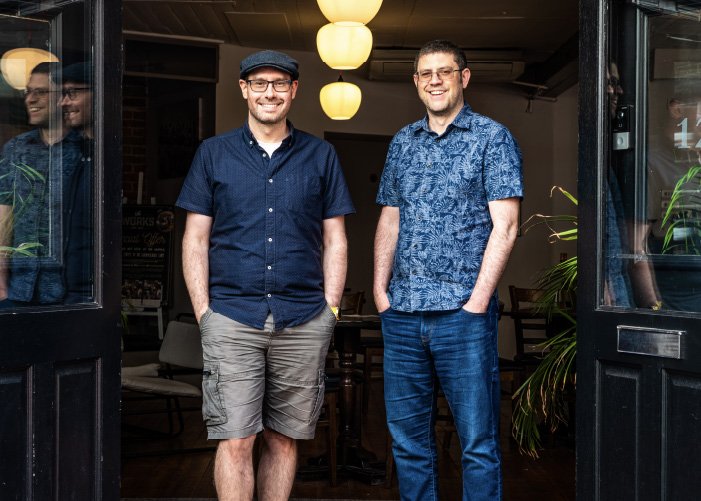A Chat With: Tom Fielder at Switchplane
By Donna Fielder and Sarah Cronk
Every month, we speak to people working in digital in and around Eastbourne. This month, we caught up with Tom Fielder, CTO at custom software development firm Switchplane, to find out about his career and company.
Chalk: Firstly, why did you choose software development as a career?
Tom: “I’ve been interested in computers from a young age. I was fascinated by the computer room at school and loved being able to go in and play a game or write a little programme. I found it really good fun.
“My dad worked in IT, so in some ways, my career in software development has been a bit of a legacy from him. We always had computers around the house and I would see him programming. After trying it for myself, I realised I was good at it too and it was really satisfying to be able to solve a problem.”
You started Switchplane with your brother back in 2003. What led you to start up the business all those years ago?
“I went to college to study Computer Science, but I soon found the course wasn’t up to scratch and that I knew more than the teacher. I was young, arrogant and thought I knew everything already! So that was the starting point - I decided to quit college.
“At that point, my brother Joel had just graduated from uni, so we decided to test the water and start a business. We first launched ourselves under my dad’s brand and then on our own.”
What significant changes have you seen in the tech industry since starting Switchplane? And have they all been for the better?
“There have been so many changes, considering I’m not even 40 yet! Back at the start, we were just focused on web, one small area of today’s broad spectrum of what’s known as tech. We were wrestling with IE6, trying to get it render on the screen. There was next to no compliance. Software companies would create different versions of things that weren’t compliant with something else. It created a lot of headaches.
“Back then, there was no such thing as cloud computing. You would rent a server on a co-located space and FTP your files to it. These days, things are completely different with cloud computing and high scalability. There’s all sorts of tech available to you now, thanks to companies like AWS and Google, for example. This helps make really complex tech available to everyone.
“Standardisation is much better now and, generally, a good thing. But I think we are getting more and more addicted to tech, which is probably not so good and as a downside, we struggle to switch off. I certainly spend too much time looking at my phone! But in general, these things have helped us to simplify our lives for the most part and help us to stay more productive.
“There have been a lot of changes with coding languages. Even well-established ones like PHP have iterated several times over. There weren’t standard frameworks like there are now, and not as many standards. It’s now easier to write more complex code without breaking things and safer environments to code in. There were no open-source frameworks available when we started the business back in 2003, now there are several. All of these things help developers to do a better job.
“There are also a lot more specialised languages now, many of which have evolved from Javascript. Programming languages are basically all the same but just written in slightly different ways.
“Low code/no code is good if the platform you are using is powerful enough. It’s a good tool for learning logic and for those getting into the industry, but you’ll eventually come up against something you can’t do as it’s not been exposed by the platform. You would probably be better at writing low code/no code if you understood the stuff underneath.”
What clients have you been particularly proud to work with, and why?
“I’ve worked on the British Airport Transfers project since its inception, so that must be about 15 years. It was essentially Uber before Uber existed. We took that business from having one driver, the owner, to a large fleet of drivers and a multimillion-pound business. That’s satisfying and there has been some really interesting tech involved along the way.
“I’d also mention the Stay Alive app for Grassroots Suicide Prevention, which I started working on maybe 10 years ago. It’s a pocket suicide prevention app to help people stay safe from suicide. It’s proven to have worked and has helped a lot of people. As a software developer, I can say I have helped to save someone's life!”
As a business owner, what have been your proud moments?
“There is no ‘how to start a business’ school. The business is essentially your child! When you hire your first employee or take on your first office premises, these are big moments. Being able to pay yourself is also a proud moment; early on we went many months earning next to nothing to get the business up to scratch. It’s very satisfying when you are finally able to pay yourself a wage and do the things you want to do.
“Employing other people is up there too. When people come into an interview, they view you as the expert that they want to impress. And you’re sitting there knowing you have never run an interview process before! It’s a strange situation.
“Being able to hire someone for the first time is a game-changer in any business. Seeing other people grow, seeing the opportunity you provide for them, and seeing them spend the money they have earned working for you is really rewarding and hugely satisfying for me personally.”
What are the biggest challenges for the business at the moment?
“Stability is always a challenge, especially post-pandemic. For us, staff recruitment is hard. The whole marketplace has changed. People can work from anywhere, so local people are looking at jobs everywhere.
“There is a lot of change going on in the world at the moment - war, prices increasing. What do we do as a business? How do we make sure our employees are looked after? How can we give them more money without having to pass that on to our clients? It’s a difficult balancing act at the moment. It doesn’t look like it’s going to get easier any time soon either, so that’s the biggest challenge right now.”
You have a rebrand for Switchplane on the horizon. Why have you decided to rebrand? How does that reflect the future direction of Switchplane?
“Because the market and competition are changing, our business also needs to change, adapt and focus on what we’re good at. Historically we have offered websites, apps and complex e-commerce. With the advent of platforms like Squarespace, and even WordPress, the market where people want a decent-looking website is flooded by those free or very cheap options. They’re fine and suit the needs of a lot of businesses. For us to compete and essentially provide a Formula 1 car to drive a standard website just doesn’t make sense - the costs don’t work out.
“We have to think about what we are good at - the complex stuff - and focus on bespoke custom software development. We’re not pivoting at all really, just focusing more on our core skills.
“Whilst one end of the market has shrunk for us - the more simple website work - the other end of the market has opened up massively. People can see the power of the web more than ever before. Every business has some kind of web platform, or should do, and need to integrate with other systems. That's where we come in.”
What advice would you give people trying to start working in your field?
“You need to get yourself a Github account and you need to start tinkering. You need to start writing a project of some kind. It doesn’t need to be groundbreaking, just fun. It needs to demonstrate your curiosity.
“When I am looking to hire, I am not looking for someone with 10 degrees in Computer Science. I’m looking for someone intrinsically motivated to write software because they enjoy it. It doesn’t matter what it is, but it needs to be something they can clearly enjoy.
“Having a Github available to show prospective employers is your best bet to getting across your desire to work in the field.”
Is it important to you to stay living and working in Eastbourne? And if so, why?
“We’ve never felt the overpowering need to relocate the business elsewhere. My brother Joel and I don’t want to get into a rat race. We don’t want to live our lives full of stress; that is what I associate with London and trying to compete in a marketplace like that. We’re both very driven, don’t misread into that, but we have always been lucky in Eastbourne that we have had enough business to grow the company and take on employees.
“I would much rather live here in Eastbourne than in London. It’s a nice place, it gets the sunshine, it’s got a beach, a nice atmosphere compared to Brighton. It has loads going on for families and that works for me at this point in my life.”
Hear more from Tom and his fellow developers at Switchplane talking about their love of their roles:



